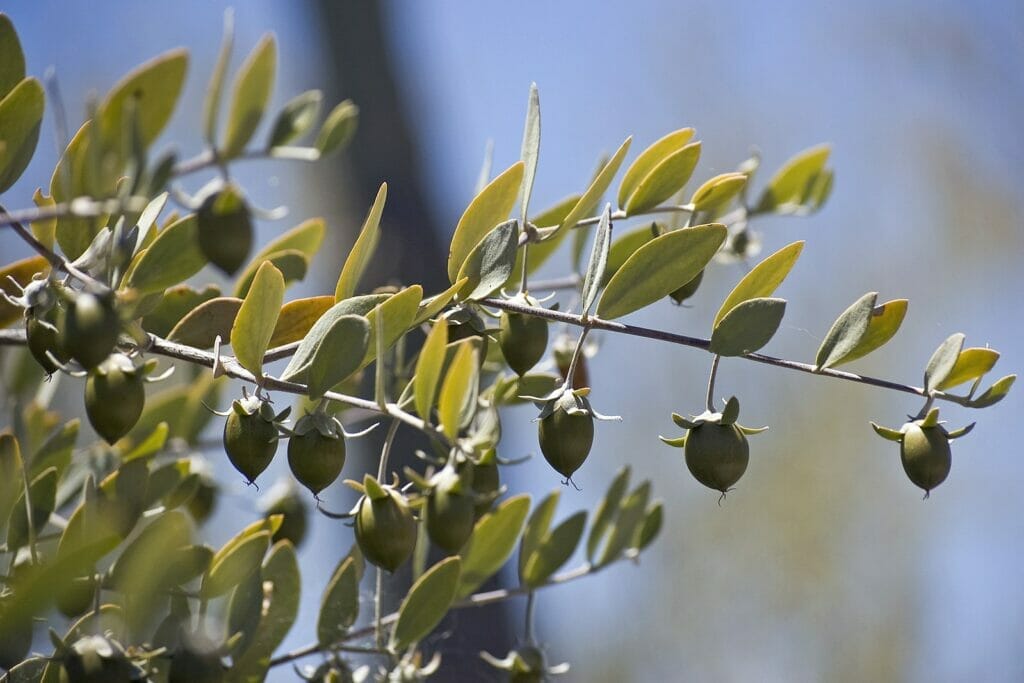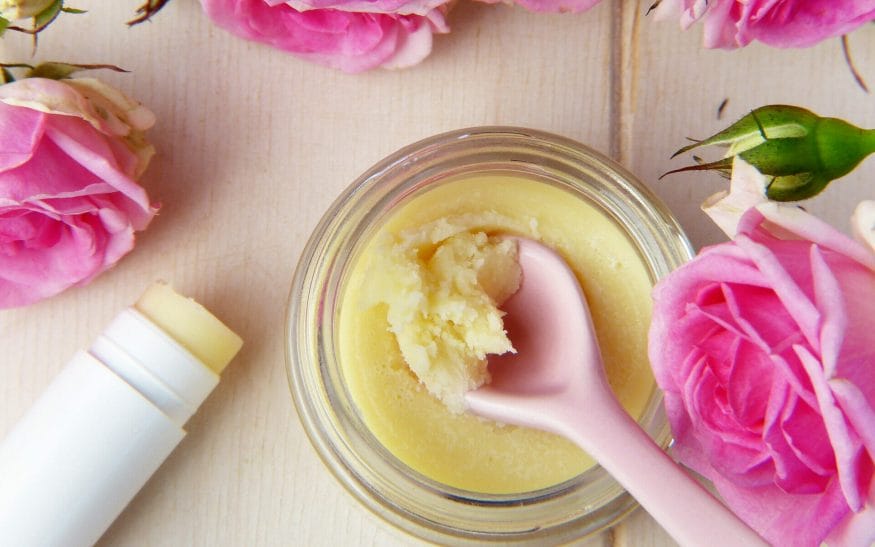Jojoba oil is widely known for its amazing skin benefits. It contains vitamin E, which can heal and prevent scars and wounds and is also beneficial for people suffering from eczema.
However, have you tried jojoba oil for hair?
With a wax-like texture, jojoba oil moisturizes your hair, prevents balding, and encourages hair regrowth. There are also tons of other benefits that accompany jojoba oil that we’ll be getting right into in this article, along with giving you some tips on how to apply jojoba oil to your hair and what hair types it is best suitable for.
What is Jojoba Oil?
Jojoba oil is less of an oil and more of a wax ester, which has a texture similar to the sebum produced by our skin. This texture is what differentiates it from other essential oils out there. It is obtained from the seeds of the Jojoba plant, that’s also referred to as Simmondsia Chinensis plant. Originating in North America, this shrub also grows in northern Mexico, southern California, and Arizona.

Credit: Kenneth Bosma
The oil-like wax is rich in vitamins and minerals, such as vitamins B, C, and E, and zinc and copper. These keep your hair follicles moisturized, which, in turn, prevents hair loss and dryness.
Jojoba oil has been in use for decades and has now been added to food and cosmetics too in the late 90s due to its range of beneficial properties. Let’s discuss jojoba oil’s benefits for hair in detail below.
Benefits of Jojoba Oil for Hair
Here are the top seven benefits of jojoba oil to keep those luscious hair strands healthy and glowing all day long:
Non-Comedogenic
Compared to other oils that can be very greasy, jojoba oil is lightweight and doesn’t leave behind any sticky residue. Because its texture is similar to skin’s natural sebum, it doesn’t clog the pores on your scalp or cause breakouts and dissolves the dirt and grime in your hair, cleaning it effectively. This makes it a great option for anyone with a dry scalp, providing sufficient nourishment, and it’s relatively easy to wash your hair afterward.
Moisturizes Hair
Due to its light texture and impermeability, jojoba oil doesn’t penetrate the hair shaft. Instead, it sits on the outer cuticle and locks the moisture in your damp hair, keeping it hydrated for longer. This is a huge benefit because while other oils, such as argan, hemp, and coconut, penetrate your hair shaft and provide moisture from within the scalp, jojoba oil acts like a conditioner and gives you external moisture.
This is why it is best to pair jojoba oil with another, heavier oil to provide both internal and external conditioning.
Nourishes Curls
Anyone with curly hair can feel the frustration of their curls getting out of hand, losing their structure, or suffering from damage and dryness easily. Jojoba oil is a savior for people with dry and curly hair.
This is because jojoba oil has a similar structure to sebum, and while natural human sebum can’t make its way to the ends of your hair, jojoba oil is a great alternative that you can use to nourish your curls and revive them to their original bounce.
Reduces Frizz
Frizz is the ultimate nightmare for every girl who wants nothing else but to show off those luscious strands. I know for sure it is for me – my hair is super thick and frizzy, which makes getting it under control so difficult!
If you suffer from flyaways and frizzy hair like me, jojoba oil is your savior! Its sebum-like texture and ability to seal in moisture after you wash your hair minimize frizz, prevent breakage, and give a deep conditioning effect.
Frizz occurs because your hair is too dry and it is trying to get some moisture from its environment. To rectify this, use jojoba oil directly on your hair or conditioners that have jojoba oil in them.
Reduces Dandruff
Jojoba oil moisturizes your scalp and restores its natural pH balance, sending a signal to the hair follicles not to produce more sebum as there is enough on the scalp already. This way, your scalp doesn’t suffer from excessive sebum and thus reduces dandruff.
Thickens Hair and Encourages Hair Growth
Jojoba oil contains vitamins A, D, and E, along with omega 6 and 9 fatty acids that nourish hair, thicken them, and allow new hair to grow.
Vitamin A has amazing antioxidant properties that trigger the skin glands to produce more or less sebum to maintain the pH balance of the scalp, thus keeping the scalp moisturized and allowing hair follicles to push out new hair.
Vitamin E nourishes our skin, which keeps our scalp healthy and repairs any damaged hair follicles, resulting in hair regrowth. It can also reduce inflammation and fight bacteria and environmental damage to your hair and skin.
Vitamin D is a hormone synthesized after our body is exposed to sunlight. It is produced by our liver and kidneys and also regulates calcium metabolism in our bloodstream. It plays a huge role in hair regrowth, as vitamin D deficiency can lead to hair loss and dull hair.
Omega 6 fatty acids are responsible for restoring our skin’s lipid structure. Lipids, along with keratin, are the building blocks of our hair. While lipids only contribute to 4% of our hair’s overall structure, they are still essential in keeping our hair healthy. This is because lipids help glue keratin together to make up the hair structure. Losing lipids would also mean you are losing keratin, too, the protein that makes up most parts of our hair. So, omega 6 helps boost hair growth, maintaining hair density and giving it a beautiful shine.
Omega 9 is an unsaturated fatty acid that is known for eliminating bad cholesterol from your body and promoting good cholesterol. It has great hydrating properties and improves skin elasticity, helping it stay young and plumpy. Applying jojoba oil to your hair helps get rid of dryness and keeps your scalp hydrated, resulting in soft and moisturized hair.
Repairs Hair Damaged From Over Styling and Heat
If your go-to before going out is a hair straightener, curling iron, or styling spray, chances are your hair has become damaged, brittle, and dry. Dry and brittle hair can break easily and also develop split ends that hinder hair growth.
I recently decided to transform my looks by going for a long balayage on my brunette hair. The bleaching made my hair dry and even more frizzy than before. Jojoba oil for my hair has been a savior since then.
What you need is jojoba oil to help retain moisture in your hair, revive them back to its natural shine and texture, and repair damage done due to extra heat. Because jojoba oil is lightweight and can’t penetrate the hair shaft, it settles on each strand of your hair and fills in the cracks, repairing them.
What Hair Types Is Jojoba Oil Best Suited For?
Jojoba oil can work for different hair types, such as curly, straight, thick, thin, normal, and dry hair.
- Curly Hair: Jojoba oil can work wonders for curly, highly coiled hair that is harder to tame. As a lightweight oil, it seals in moisture, acting as a hair conditioner that gives your curls a proper structure while also maintaining shine and getting rid of frizz and flyaways. Frizz is also associated with dryer hair, and because jojoba oil is similar to sebum, it allows your curly hair to get the amount of sebum it needs to stay nourished.
- Straight Hair: People with slick-straight hair often complain of their hair looking greasy after a day’s wash. Jojoba oil helps restore your scalp’s pH balance, thus regulating sebum production. It also dissolves any dirt or grime on your scalp, cleansing your hair and allowing you to go for more than a day without greasy hair. If you are someone who straightens your hair a lot, chances are you can damage your hair due to excessive heat. Jojoba oil acts as a protective coating that prevents heat damage to your strands. Now you can straighten your hair without worrying about lifeless, dull hair.
- Thick Hair: Jojoba oil is known for growing new hair and repairing damaged hair. If you have thick hair that is losing its shine and bounce, have split ends, or look like they have given up on you, jojoba oil is a must-have for you. Omega 9 provides hydrating properties that will allow your hair to regain its moisture, while vitamins A, D, and E keep your scalp clean, hydrated, and free from dandruff. This results in healthier, revitalized hair.
- Thin Hair: Perhaps jojoba oil is best suited for thin hair types. Thinner hair can look greasy if you apply denser oils, such as coconut oil and argan oil. But jojoba oil is lightweight, moisturizing, and provides a helping hand in cleansing your scalp from dirt and buildup. Moreover, it helps in hair regrowth and repairing damaged hair.
How To Use Jojoba Oil
There are different ways you can incorporate jojoba oil into your hair care routine:
Hair and Scalp Massage
- Fill your palm with jojoba oil serum and warm it between your palms.
- Massage your hair and scalp using your fingertips.
- You can slightly heat the oil so it can absorb better in your scalp and hair.
- Now apply the oil to the rest of your hair.
- Rub it using your palms
- Brush your hair to help the oil absorb evenly in your hair, and let it work as a leave-in conditioner.
- Leave for at least 20 minutes to one hour before washing. You can put on a shower cap at this time to help keep the mess in.
- Pour 2-3 drops of jojoba oil into your palm and apply on wet hair to act as a conditioner and lock in moisture.
Use As a Sealant
As jojoba oil helps seal moisture, it can be used as a sealant as part of pre-shampoo treatment.
- Before washing your hair, add a few drops of the oil to your fingers.
- Run your fingers through your hair from the roots to the tips.
- Now shampoo your hair.
This way, the shampoo won’t strip your hair from its natural oils, as jojoba oil would act as a protective layer.
Add It To Your Conditioner
You can also use jojoba oil in combination with other hair care products – add a few drops of oil to your conditioner or hair mask to help it retain most of the moisture after washing. For oily hair, add two to three drops of jojoba oil. However, drier, coarse, or curly hair can take in more than a few drops. Try not to go overboard because the goal is to improve your hair texture and help it regain its shine rather than making your hair greasy.
Mix It With Other Oils
Apart from your hair conditioner, you can also mix jojoba oil with carrier oils to strengthen its benefits and increase its potency. Carrier oils like coconut oil, olive oil, safflower oil, rosehip oil, and argan oil are great for repairing hair damage and replenishing broken hair and dry hair follicles. The combinations you can make with it are endless, making it a wonderful hair mask ingredient.
FAQs
Can I use jojoba oil in my hair every day?
You best off to use Jojoba oil as a hair treatment once or twice a week. If you have very dry or coarse hair, you can increase it to three times a week to act as a sealant. However, perform a patch test first on a part of your scalp that is visible to you to check for any allergic reactions. If you aren’t sensitive to jojoba oil, go ahead and use it for healthy, glowing hair.
Which is better, coconut oil or jojoba oil for hair?
Coconut oil and jojoba oil both offer unique benefits for hair, but it depends on your specific needs. Coconut oil deeply moisturizes and strengthens hair, while jojoba oil closely resembles natural sebum and promotes scalp health. Consider your hair type and concerns to choose the one that suits you best.
How to use jojoba oil for hair growth?
To use jojoba oil for hair growth, gently warm the oil and massage it into your scalp using circular motions. Leave it on overnight or for at least 30 minutes before washing your hair. Regular application can help nourish the scalp, stimulate hair follicles, and support healthy hair growth.
Is jojoba oil good for your hair?
Yes, jojoba oil can be an excellent addition to your hair care regimen. Its molecular structure closely resembles our natural sebum, making it a fantastic moisturizer and conditioner. Jojoba oil helps balance scalp oil production, prevents dryness, and nourishes hair follicles, promoting healthy hair growth. It is also lightweight, non-greasy, and suitable for all hair types.
Should I apply Jojoba oil on wet hair or dry hair?
You can apply it to both wet and dry hair. For wet hair, take two to three drops and run them into your strands to lock in moisture. Apply generously on dry hair and massage your scalp, too, to gain more benefits from this oil.


